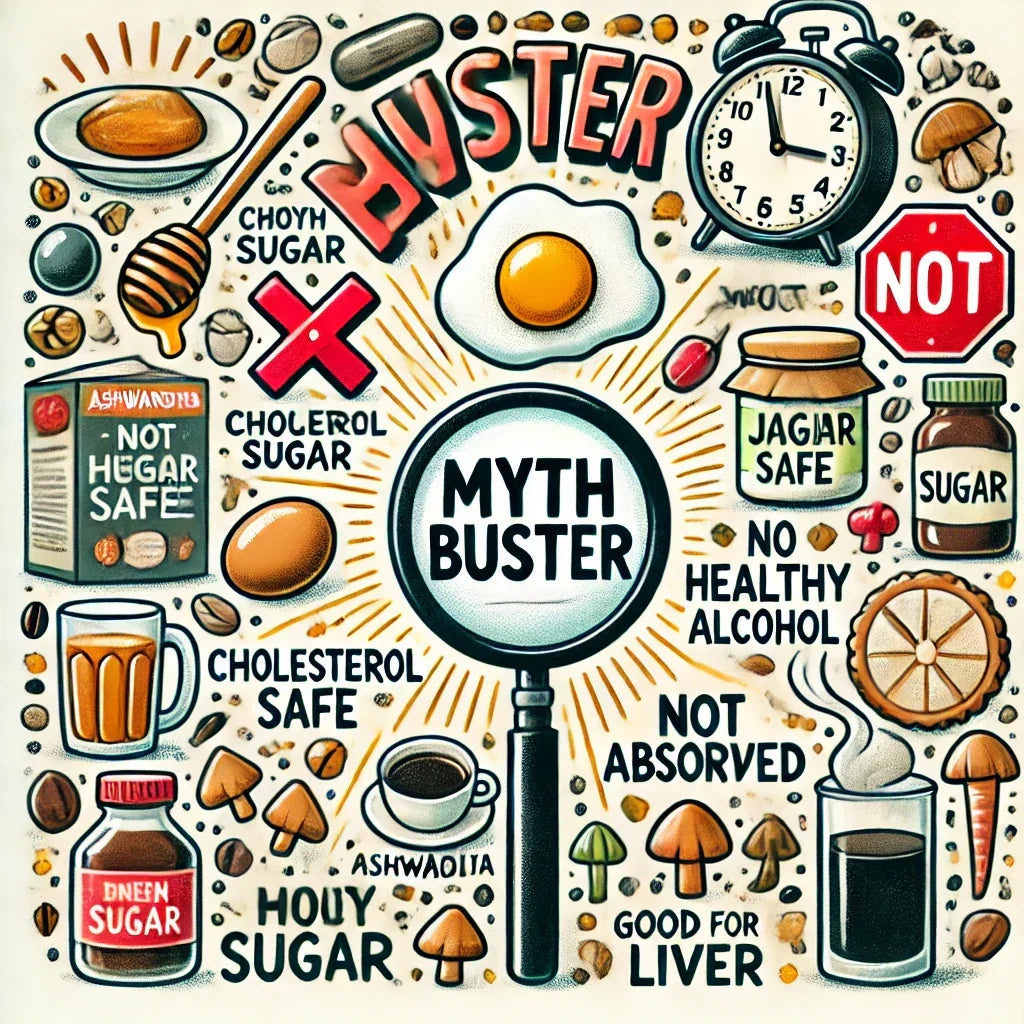
Busting 20 Popular Nutrition Myths
Share
Every day, we are bombarded with health and nutrition advice—some of it backed by science, and some that have taken on a life of their own despite lacking any real evidence. Let’s bust 20 common myths once and for all.
1. One Whole Egg with Yolk a Day Does Not Increase Blood Cholesterol
Contrary to popular belief, eating an egg a day does not significantly raise blood cholesterol levels. Dietary cholesterol has minimal impact on blood cholesterol compared to saturated and trans fats.
2. Green Tea Does Not Help You Lose Weight
Drinking green tea alone won’t lead to weight loss. While it may slightly boost metabolism, meaningful weight loss only happens with a calorie deficit and exercise.
3. Jaggery, Honey, or Sugarcane Are Not Healthier Than White Sugar
All these sweeteners contain similar amounts of sugar and have comparable effects on blood glucose levels. There’s no substantial health advantage in choosing one over the other.
4. There Is No "Healthy Alcohol"
Alcohol, regardless of type or quantity, is not beneficial for health. While moderate consumption may not cause immediate harm, no alcohol is truly "healthy."
5. Ashwagandha Does Not Reduce Stress or Help You Sleep
Despite marketing claims, scientific evidence supporting ashwagandha’s impact on stress reduction or sleep quality remains inconclusive.
6. Shilajit Does Not Benefit Male Sexual Health
Shilajit is often marketed as a remedy for male sexual health, but no robust clinical evidence supports these claims. It remains a resinous substance without proven benefits.
7. Turmeric in Milk Is Not Absorbed Well by the Body
Drinking turmeric milk does not ensure beneficial absorption of curcumin (turmeric’s active compound), as most of it is excreted in stool without proper fat or piperine (black pepper) consumption.
8. You Can Consume Fruits Anytime During the Day or Night
There is no scientific basis for restricting fruit consumption to specific times of the day. Eating fruits at night does not hinder digestion or cause weight gain.
9. Sugarless Black Coffee (at Least 3 Cups) Is Good for Steatotic Liver Disease
Studies suggest that moderate black coffee consumption can be beneficial for fatty liver disease due to its antioxidant properties.
10. Apple Cider Vinegar Is Only Good for Trapping Fruit Flies
Apple cider vinegar has limited health benefits beyond minor effects on digestion and blood sugar. However, it works great as a fruit fly trap!
11. Eight Glasses of Water a Day Is a Myth
Hydration needs vary from person to person. Drinking when thirsty is a better approach rather than adhering to an arbitrary number.
12. Pure Whey Protein Supplementation Is Safe for the Liver and Kidneys
Whey protein, when consumed within recommended limits, does not harm the liver or kidneys in healthy individuals. Protein intake should align with dietary needs and activity levels.
13. Resveratrol Does Not Reverse Aging
Resveratrol, found in red wine and grapes, is often promoted as an anti-aging compound, but current research does not support its ability to reverse aging in humans.
14. Basic Scientists Are Not Clinical Doctors
While basic scientists contribute significantly to medical research, they are not trained clinicians and do not provide medical advice or treatment.
15. Every Fad Diet That Worked for Weight Loss Did So Due to Caloric Deficit
Regardless of the diet—keto, paleo, intermittent fasting—weight loss occurs due to a calorie deficit, not because of any unique magical property of the diet itself.
16. Consumption of Dairy Along with Fruits Is Perfectly Fine
There is no scientific reason to avoid combining dairy and fruits. This combination is commonly consumed worldwide without adverse effects.
17. Yoga Does Not Help You Lose Weight
While yoga has numerous mental and physical health benefits, it is not a primary method for weight loss. A calorie deficit through diet and more intense exercise is required for fat loss.
18. A Multivitamin a Day Does Not Improve Health or Prevent Disease in General Populations
For most healthy individuals, multivitamin supplements do not provide significant health benefits or disease prevention beyond a well-balanced diet.
19. Biotin Does Not Help in Hair Growth or Increase Hair Length
Despite its popularity, biotin supplementation does not significantly impact hair growth unless a person has a diagnosed deficiency.
Final Thoughts
Misinformation about health and nutrition spreads quickly, but staying informed with science-backed knowledge is essential. Always consult reliable sources and professionals before making dietary or lifestyle changes!
